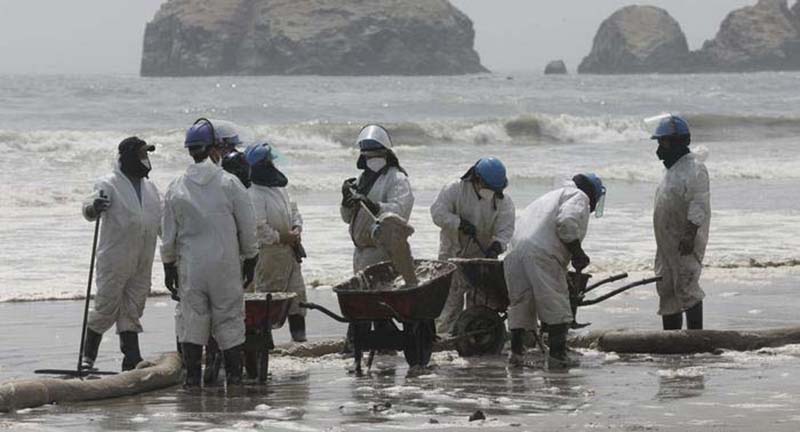The aftermath of major oil spills that wreak economic and environmental havoc, particularly when these occur in developing countries, never really vary a great deal from country to country. These usually take a familiar pattern of the host population seeking to come to terms with the loss of livelihoods – arising particularly out of the pollution of waterways – and the wider environmental damage inflicted by the effects of huge swathes of usually thick black oil. These, apart from their disruption of important food chains, can also have longer-term health-related environmental effects.
As if these were not enough, there is the recrimination arising out of the who’s-to-blame debate. Here, it is, almost invariably, a weak home government along with (sometimes) a militant but largely powerless local environmental lobby crossing swords with a powerful international oil company which, frequently, long before the damage is done, would have already sought to insulate itself against litigation-related culpability.
The most recent reports arising out of the January 15 oil spill into Peru’s waterways linked to tremors resulting from the earthquake in Tonga, suggest that the probe into this occurrence is following pretty much the same pattern as many of those that preceded it. Seeking, it seems, to ensure that it remains ‘close’ to Repsol, the Spanish energy and petrochemical company involved in the oil spill, the Peruvian courts have moved to stop the oil company’s Peru director and three other executives from leaving the country, reportedly for a period of eighteen months, even as the authorities seek to plough through matters to do with cause and culpability.
The Peruvian authorities, meanwhile, have now assessed the damage done by the oil spill to be probably much worse than originally thought, the estimate of the size of the oil spill having been raised to at least 11,900 barrels, and counting, up from the earlier 6,000-barrel estimate. Repsol itself had reportedly put the spill at 10,396 barrels, up from an earlier company estimate of around 6,000 barrels.
Whatever the ‘numbers’, what appears not to be in dispute, following the initial assessment of the scale of the spill is that it will have a significant socio-economic impact on the affected spaces and populations as well as on the cost and time-frame associated with the cleanup.
Touted as being among the best on the continent, Peru’s beaches are known to be one of the ‘jewels’ in the country’s tourism crown. Official reports of an environmental emergency attended by the closure of twenty one of the country’s beaches on its Pacific Coast is more than likely to create a deep furrow in the brow of the Peruvian government given that visitor arrivals have already been affected by the Covid-19 pandemic.
Not unexpectedly, Peruvian prosecutors have already moved to open an investigation into what is being termed a crime of “environmental contamination.”
Repsol however, seems to have already embraced a measure of responsibility in the matter, reportedly recruiting in excess of 2,000 people, including local fishermen, to clean the beaches. Commitments have also reportedly been made in the matter of delivering food baskets to the affected families even though it is unclear as to just how long these handouts will last.
While Peru is reportedly no stranger to environmental emergencies, this latest incident is the worst environmental crisis experienced by this Andean country in recent years.
Inevitably, some measure of ‘bad blood’ has surfaced between Repsol and the Peruvian authorities with the government in Lima reportedly issuing an assertive call to the petrochemical company to resolve the “environmental damage.” The Peruvian Prime Minister, Mirtha Vásquez, has also criticized what the authorities in Lima see as the slow response of Repsol to the oil spill (she has since resigned from the position of Prime Minister). The company, the Peruvian government says, had no contingency plans in the event of occurrences such as this one. Further, the Peruvian authorities have also reportedly charged that they were misled by Repsol when the company initially reported a small spill and did not issue public warnings so that the coastal population could take protective actions such as avoiding entering the beaches.
Peru, last week, was also counting the cost in terms of seabirds, including its rare Humboldt Penguin in areas said to be rich in marine biodiversity.
Beyond the oil spill and its consequences for Peru, the occurrence is also likely to shift global monitoring attention even more closely to oil and gas operations in the hemisphere where probes and oil recovery operations are at their highest levels. Setting aside Venezuela, long regarded as the continent’s oil giant, various levels of oil recovery and oil probe operations are currently underway offshore Guyana, Brazil and Suriname, under the ‘gimlet eye’ of environmental watchers. Guyana, which, a matter of days ago, began to benefit from access to the returns from its oil and gas bonanza to support the country’s 2022 budgetary allocations has experienced modest but probing pockets of environmental pushback that point to the dangers associated with oil recovery and related devastating oil spills.




